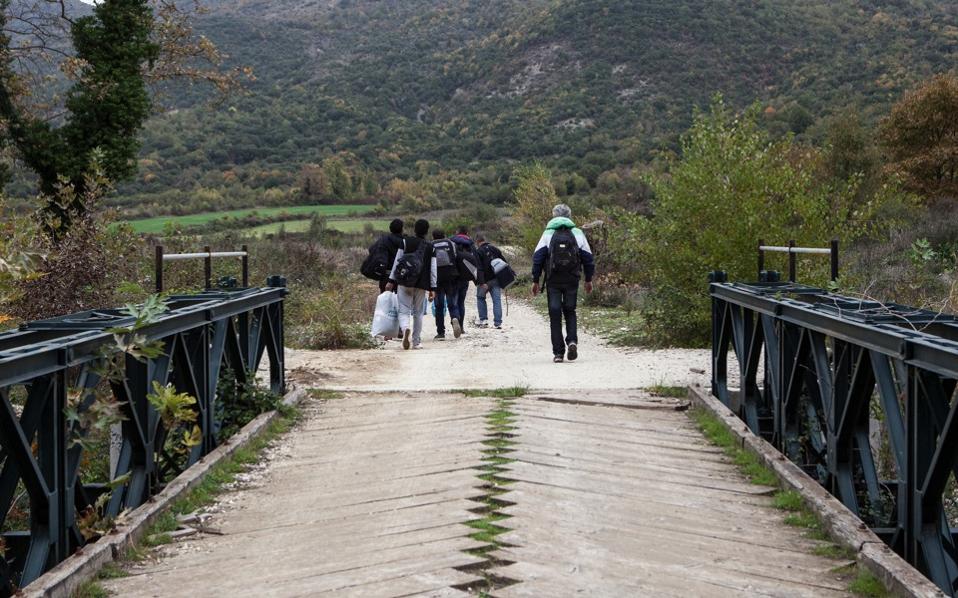
Syrian refugees cross a bridge in Gjirokaster, Albania, near the Kakavia border crossing from Greece, in a 2014 photograph.
Kathimerini
In a previous article, “The Balkans and migratory flows” (CNN.gr, 26/10/2015) we glimpsed at the Austrian policy of erecting walls and the risk of accumulation of refugees on Greek territory, and especially in the Balkans, with consequences for regional geopolitical security and stability. With the border between Greece and the Former Yugoslav Republic of Macedonia (FYROM) closed, Greece appears to be isolated from the neighborhood and the European mainland. While the problems are growing, the government of Prime Minister Alexis Tsipras trying to improvise a solution and Brussels still looking, Greece seems again favored by geography.
Among Greece’s long Greek borders with its Balkan neighbors, only the Greek-Albanian one cannot be controlled because it is mountainous and with a large number of accessible paths. Therefore, the government of Edi Rama may verbally express its opposition to the possibility of migration flows going through Albania but it is impossible to implement such a decision. The reasons are obvious. Nobody can stop the peaceful determination of populations to move. Given Skopje’s policy of closed borders and the willingness of immigrants to move northwards, as well the failure of each transit country to provide them with the basics for a temporary stay, it should be viewed as certain that in the coming days and weeks, with the arrival of spring, the migrants now trapped in Greece will head towards the border with Albania. What will happen then?
Albania will try to stop this flow through the Greek border stations of Krystalopigi, Mertziani and Kakavia – but in vain. No wall can be erected on uneven terrain. Parallel paths are not patrolled because they are numerous, anomalous and extensive. Therefore, the Albanian authorities will not be able to stop the flows peacefully. Albanians know this and although the prime minister has expressed his opposition, he has already ordered the construction of two reception centers for a total of 10,000 immigrants in Korce and Gjirokaster.
Such a development would essentially mean the cancellation of the Austrian refugee policy in the Balkans because immigrants will be able to access the FYROM territories and Kosovo from Albania and therefore to move northwards to Serbia, Montenegro and Bosnia.
Additionally, the problem will be internationalized once more and put more pressure on Brussels to find an effective solution. Austria is expected to attempt to erect a new wall to the north, but to no avail, because the problem will be shared not only by Greece but the whole of the Balkans.
The Albanian corridor can give Greece a chance to gain some time in dealing with the influx from Turkey, to relieve the Greek-FYROM border and to provide the EU with a final opportunity to prove that it is a union of friends and not enemies.
* Dr Evangelos Venetis is a specialist in refugee and migration studies. The coordinator of the Middle East Research Project of the Hellenic Foundation for European and Foreign Policy (ELIAMEP) recently joined the Refugee Studies Program at the Stavros Niarchos Center for Hellenic Studies, Simon Fraser University, Vancouver.
No comments:
Post a Comment